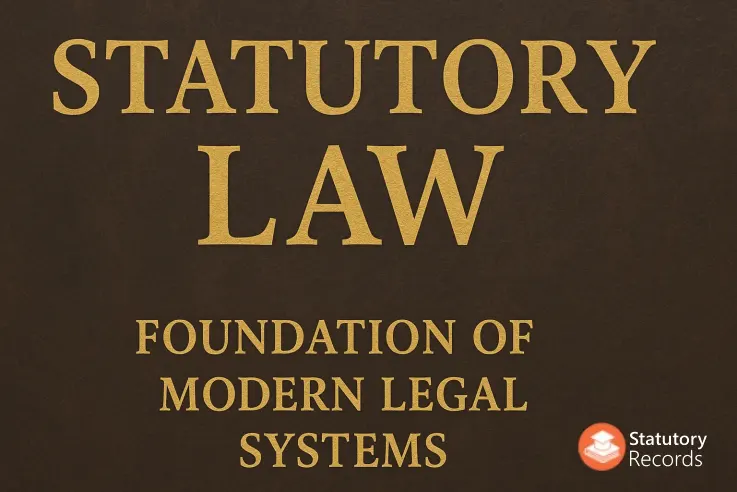
Statutory Law: Foundation of Modern Legal Systems
Legal systems around the world rely on various sources of law to maintain order, justice, and societal structure. Among these sources, statutory law plays a crucial role in shaping regulations, rights, and obligations. But what exactly is statutory law, and how does it differ from common law and statute law? More importantly, what are the key benefits of statutory law in modern legal frameworks?
This comprehensive guide explores the definition of statutory law, its distinctions from other legal sources, and its significant advantages in governance and jurisprudence.
Defining Statutory Law
Statutory law refers to written laws formally enacted by a legislative body, such as a parliament or congress. These laws are codified and published, making them accessible to the public and enforceable by courts. Statutory law is the product of a formal legislative process, in contrast to common law, which develops over time through court rulings and established precedents.
Statutory laws cover a wide range of subjects, including criminal offenses, taxation, business regulations, and civil rights. Notable examples are the Civil Rights Act of 1964 (USA), the Companies Act (UK), and the Indian Penal Code. Because statutory laws are explicitly written, they provide clarity and consistency in legal interpretation.
Statutory Law vs. Common Law vs. Statute Law
To fully grasp the significance of statutory law, it’s essential to differentiate it from related legal concepts:
1. Statutory Law vs. Common Law
- Statutory Law: Created by legislative bodies, statutory law is formal, written, and codified. It is designed to address specific legal issues and can be amended or repealed by subsequent legislation.
- Common Law: Derived from judicial decisions and precedents, common law is unwritten and evolves over time based on court rulings. It addresses areas where statutory law is lacking or doesn’t provide clarity.
For example, contract law in many jurisdictions combines statutory provisions (like the Uniform Commercial Code in the U.S.) with common law principles established through case law.
2. Statutory Law vs. Statute Law
While the terms ‘statutory law’ and ‘statute law’ are frequently used as synonyms, there is a nuanced distinction between them.
- Statutory Law: Encompasses all written laws passed by a legislative authority.
- Statute Law: Refers specifically to individual laws (statutes) within the broader statutory framework.
For instance, the Clean Air Act is a statute within the larger body of U.S. environmental statutory law.
Key Benefits of Statutory Law
Statutory law offers numerous advantages that enhance legal certainty, fairness, and governance. Below are the most significant benefits:
1. Clarity and Precision
Unlike common law, which relies on judicial interpretation, statutory laws are explicitly written, reducing ambiguity. Legislators draft statutes with precise language to ensure uniform application. For example, tax codes define exact percentages and conditions, leaving little room for subjective judgment.
2. Democratic Legitimacy
Statutory laws are created by elected representatives, reflecting the will of the people. This democratic process ensures that laws align with societal values and needs. Public debates, committee reviews, and voting procedures enhance transparency in lawmaking.
3. Consistency and Uniformity
Because statutory laws are codified, they provide a consistent legal framework across jurisdictions. Federal statutes, such as the Americans with Disabilities Act (ADA), ensure uniform protections nationwide, unlike common law, which may vary by region.
4. Adaptability to Societal Changes
To respond to new developments, legislatures have the authority to modify or eliminate existing statutes. For instance, cybersecurity laws are continually updated to combat new digital threats—a flexibility that common law struggles to match due to its reliance on past rulings.
5. Enhanced Legal Predictability
Businesses, individuals, and legal professionals rely on statutory laws for predictable legal outcomes. Clear statutes on contracts, employment, and intellectual property help parties understand their rights and obligations without excessive litigation.
6. Protection of Fundamental Rights
Many statutory laws, such as anti-discrimination acts and data privacy regulations, safeguard individual freedoms. The General Data Protection Regulation (GDPR) in the EU, for example, establishes strict guidelines for personal data handling.
7. Efficient Dispute Resolution
Well-defined statutes reduce judicial workload by minimizing interpretive disputes. Courts can apply statutory text directly rather than analyzing multiple precedents, leading to faster resolutions.
Conclusion
Statutory law serves as the backbone of modern legal systems, offering clarity, consistency, and democratic legitimacy. While common law provides flexibility through judicial precedent, statutory law ensures that legal rules are transparent, accessible, and adaptable to societal needs. Understanding the distinctions between statutory law, common law, and statute law is essential for legal practitioners, policymakers, and citizens alike.
By codifying rights, duties, and prohibitions, benefits of statutory law fosters a fair and orderly society where justice is not only done but seen to be done. Whether in criminal justice, business regulation, or civil rights, statutory law remains an indispensable tool for governance in the 21st century.
